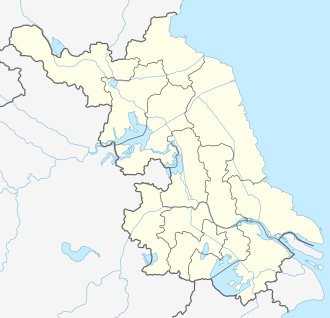Guanyun County
Guanyun County (simplified Chinese: 灌云县; traditional Chinese: 灌雲縣; pinyin: Guànyún Xiàn) is under the administration of Lianyungang, Jiangsu province, China. It borders the prefecture-level city of Suqian to the southwest and the Yellow Sea to the east.
Guanyun
灌云县 Kwanyun | |
|---|---|
 Guanyun Location in Jiangsu | |
| Coordinates: 34°24′58″N 119°28′01″E[1] | |
| Country | People's Republic of China |
| Province | Jiangsu |
| Prefecture-level city | Lianyungang |
| Area | |
| • Total | 1,538 km2 (594 sq mi) |
| Population (2018) | |
| • Total | 808,650 |
| • Density | 530/km2 (1,400/sq mi) |
| Time zone | UTC+8 (China Standard) |
| Postal code | 222200 |
General Information
Guanyun is a county under the jurisdiction of Lianyungang that is one of thirteen prefecture cities of Jiangsu Province. The name Guanyun is made of two Chinese characters, Guan and Yun, which are taken from Guan River and Yuntai Mountain, in which both of them are important landmarks for the county.
In history, Guanyun was a salt-making site for the ancient Chinese Qing Dynasty. Guan River, with its excellent condition comparing with Rhine River and water quality, recently stunned locals, seeing tens of whales from the Yellow Sea swum back into the river waterway.
Geography, Resources and Climate
Guanyun is a coastal city of the East China Sea (the Yellow Sea) with a coastline of 32 km (20 mi). It borders Guannan (a county under the jurisdiction of Lianyungang), Xiangshui (under the jurisdiction Yancheng), Lianshui (under the jurisdiction of Huai'an), and Shuyang (under the jurisdiction of Suqian).
Guanhe River is an inner river of Jiangsu, running eastwards into the China East Sea in Guanyun. The river is 77.5 km (48.2 mi) in length and its main tributary is Sihe River, flowing through the southern portion of the county. The river has been considered an excellent condition for ship transportation that one can compare it with German Rhine River or Shanghai's Huangpu River.
Guanyun is situated in the north of Jiangsu Plain and has an oceanic monsoon climate, with distinct four seasons, like most of its neighbors. The annual average temperature is close its neighbors 15°C, with 25°C in summers and 5°C in winters. Average rainfall is close to 1,000 mm annually.
Administration and Jurisdiction
Guanyun County is under the jurisdiction of Lianyungang. It comprises 7 towns and 12 townships. Its municipal government is stationed in the Town of Yishan.
In the present, Guanyun County has 7 towns and 12 townships.[2]
- 7 towns
|
|
- 12 townships
|
|
Area and Population
Guanyun County has a land mass of 1,835 km2 (708 sq mi) and the population is over a million.
Economy, Industry and Environment
Guanyun traditionally dependented on its agricultural and fishery incomes and now both are still critical financial components for the county. Over years, a few of industrial sectors have been added to the county's economy, including navigation, waterway transportation industries.
Yanwei Port, meaning "Swallow Tail Port" in Chinese, is located at the mouth of Guanhe River, very close to the East China Sea. Dubbed a "A Pearl in Yellow Sea", the port is described as an excellent sea port. It is a deep water port and would potentially become a transportation hub.
Guanhe River is an important landmark for the county, running eastwards into the East China Sea. The river is under protection of its water environment. Stunning local residents over years, tens of whales from the Yellow Sea have swum back into the river's waterway as deep as 10 km (6.2 mi). The local government has made tough by-laws to minimize the side effects of the economic growth to its water and environment. It is a sincere hope that the impact of the industrialization will not harm its environment. Guanyun County also contributes to 60% of China's annual lingerie production.
Transportation and Tourism
Guanyun is connected to the rest of Jiangsu Prevince by four expressways (Nanjing-Lianyungang, Feng-Guanyun, Lianyungang-Xuzhou and Lianyungang-Yancheng expressways) and four highway (G204, G236, G324 and G242). Within its boundary, a river network provides the county with cheap and convenient transportation.
In the inner city, the public transportation including bus, taxi and cargo transport, charted buses to near cities or towns, provides convenience to commuters even if the system still needs a major improvement. Its well-protected ecosystem offers the city valuable resources for tourism, including Kaishan Island Scenic Region, Dayishan Mountain Scenic Region, and more.
Education
Guanyun has well instituted compulsory primary education system. The secondary schools including high schools achieves significant graduate rate. No higher learning institution is available in the county.
Culture and Folklore
Guanyun was initially established as an independent jurisdiction in 1912 in Qing Dynasty.
Notable people
- Wang Dezhao (1905-1998), a well-known academician of the Chinese Academy of Sciences, was born in Guanyun. He was one of the greatest scientists in physics in China and was selected in 1988 by Swedish Academy of Sciences to recommend the Nobel Prize candidates for 1987.
- Wang Dexi (1913-), a respected academician of the Chinese Academy of Sciences, a nuclear chemistry professor, the Chairman of the Graduate School of Chinese Nuclear Ministry, was born in Guanyun and is one of brothers of Prof. Wang Dezhao
References
- Google (2014-07-02). "Guanyun" (Map). Google Maps. Google. Retrieved 2014-07-02.
- "连云港市-行政区划网 www.xzqh.org" (in Chinese). XZQH. Retrieved 2012-05-24.
- www.xzqh.org (in Chinese)